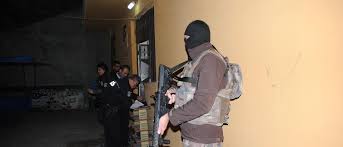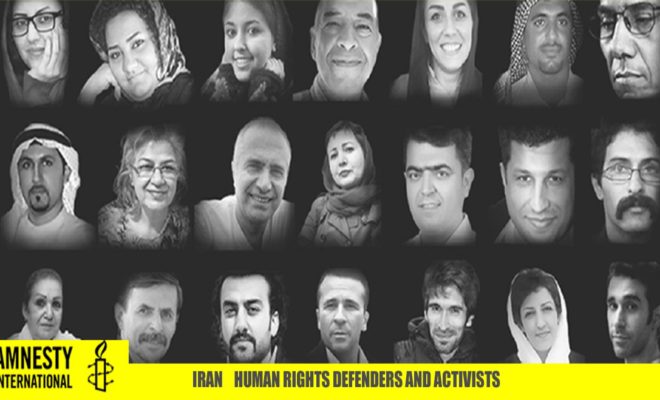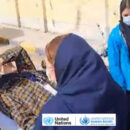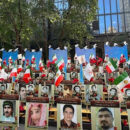Trump Administration Says Iran Could Exit Syria Amid Pandemic
FP | BY JACK DETSCH, ROBBIE GRAMER | MAY 21, 2020
The State Department’s top official for Iran thinks Russia and Syria see more benefits to a potential Iranian drawdown.
The Trump administration believes Iran has growing incentives to pull out of a multibillion-dollar military campaign in Syria as the coronavirus pandemic has ravaged the country, the U.S. State Department’s top official for Iran told Foreign Policy.
Special Representative for Iran Brian Hook said the United States has seen “tactical displacement” of Iranian troops in Syria, where Tehran-backed militias have provided much of the firepower for the Bashar al-Assad regime’s assault on Idlib province, one of the last remaining opposition holdouts in the war-torn country.
Hook’s comments come amid signs that Tehran’s enthusiasm for proxy campaigns across the Middle East could be flagging, with COVID-19 killing more than 7,000 people in Iran so far, a figure that U.S. officials believe could be much higher. Israel’s departing defense minister said this week that he’d seen Iranian forces leaving Syria but offered no evidence to back up his claim. An Iranian lawmaker also said this week that the campaign on behalf of Assad has cost as much as $30 billion.
This interview has been edited for length and clarity.
Foreign Policy: We’ve seen COVID-19 penetrate deeply into Iran’s leadership and hamper its economy. Do you see any change in Iran’s military posture as a result?
Brian Hook: Iran has [declared] about 7,000 deaths. Based on what we know, the number is probably five times that number given how they underreport. We see a pattern of behavior in both Iran and China, where people are jailed for disclosing accurate statistics. You have doctors who are fired and other people who are threatened for telling the truth. Obviously, it did not help the Iranian people when the regime in the very early stages denied and hoped it wasn’t a problem while people were dying. This is a notoriously opaque regime that has a hard time being transparent not only with its own people but the world.
We have seen some tactical displacement of Iranian troops. We see both Russia and Syria recognizing the incentives for Iranian troops and forces under Iranian command and control to leave Syria. And that has been a condition of America and the international community providing reconstruction assistance. Iran is using Syria as a platform to threaten Israel and as a corridor to keep its ties with Hezbollah. You’ve got a number of people who want to move to a post-conflict scenario in Syria, and the Iranian regime is an obstacle to that: to moving along toward a post-conflict political process. So we think that there are increasing incentives for Iran to leave Syria.
FP: The U.S. Treasury Department announced new sanctions against Iran’s interior minister and several other senior law enforcement officials. How does this specifically add to the maximum pressure campaign, and what’s even left to sanction, given that the Trump administration has already targeted so much of Iran’s economy?
BH: I think a year ago, journalists started asking me what’s left to hit in Iran. One year later, we continue to find many targets of opportunity to squeeze the regime financially. When U.S. Secretary of State Mike Pompeo two years ago in May announced our new Iran strategy post-deal, we made clear that we’re going to continue to stand with the Iranian people. And we’ve done this by calling out the regime for killing its own people. In November, the regime murdered over 1,500 people, injured thousands, and jailed anywhere between 8,000 and 10,000 people. And so today we’ve sanctioned 12 Iranians who were complicit in human rights abuses. The interior minister was one of the 12. He authorized Iran’s public forces to use lethal force on peaceful protesters. I would refer you to an Amnesty International report: There were 23 children who were killed. One of them was a 12-year-old who was returning home from school. He was fatally shot by the regime as he walked past protesters near his house. We’ve sanctioned judges, we’ve sanctioned judiciary [sector], we’ve sanctioned the interior [ministry]. And these are both financial sanctions, but they’re also visa sanctions. Given America’s reach in the global economy, these have consequences.
FP: The United States is expected to hold talks in June with the new Iraqi government. What are the priorities that the administration will be asking from Iraq related to Iran?
BH: It’s a similar problem we see in places like Lebanon and Syria in Iraq. The Iranian regime since the time of Ayatollah Ruhollah Khomeini has the desire to dominate all governments in the Middle East. Our policy is to reverse Iran’s influence across the Middle East and to help countries like Iraq and Lebanon be free of Iranian interference. And I think there’s a lot of support for that among the Iraqi people. And one of the things the prime minister will be focused on, I think, is reclaiming Iraq’s sovereignty from Iranian interference. I think the death of Qassem Suleimani [from a U.S. strike] presents a better environment for the Iraqi people to have a government that represents their interests and not the interests of the Iranian regime.
https://foreignpolicy.com/2020/05/21/trump-iran-syria-exit-coronavirus-pandemic/









